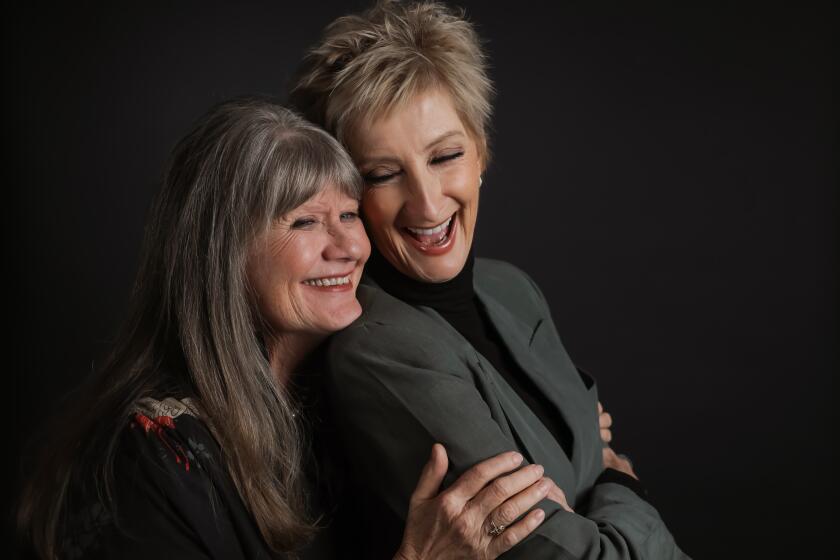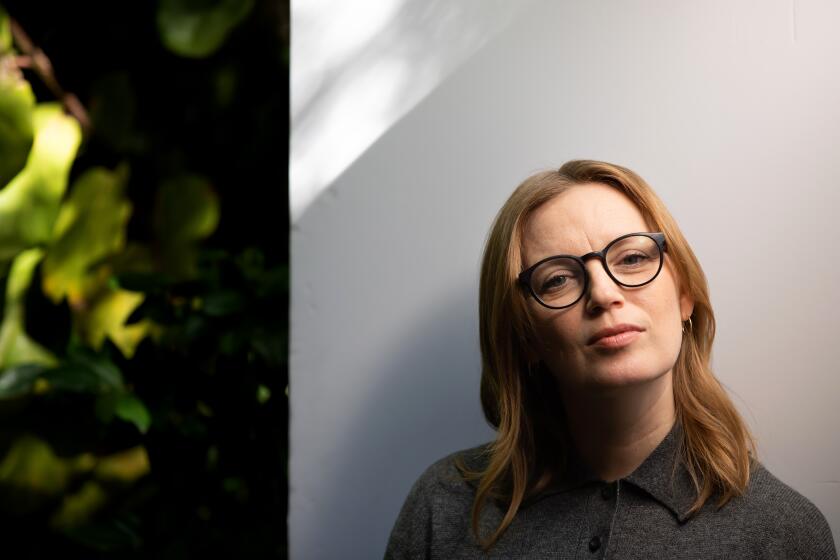- Share via
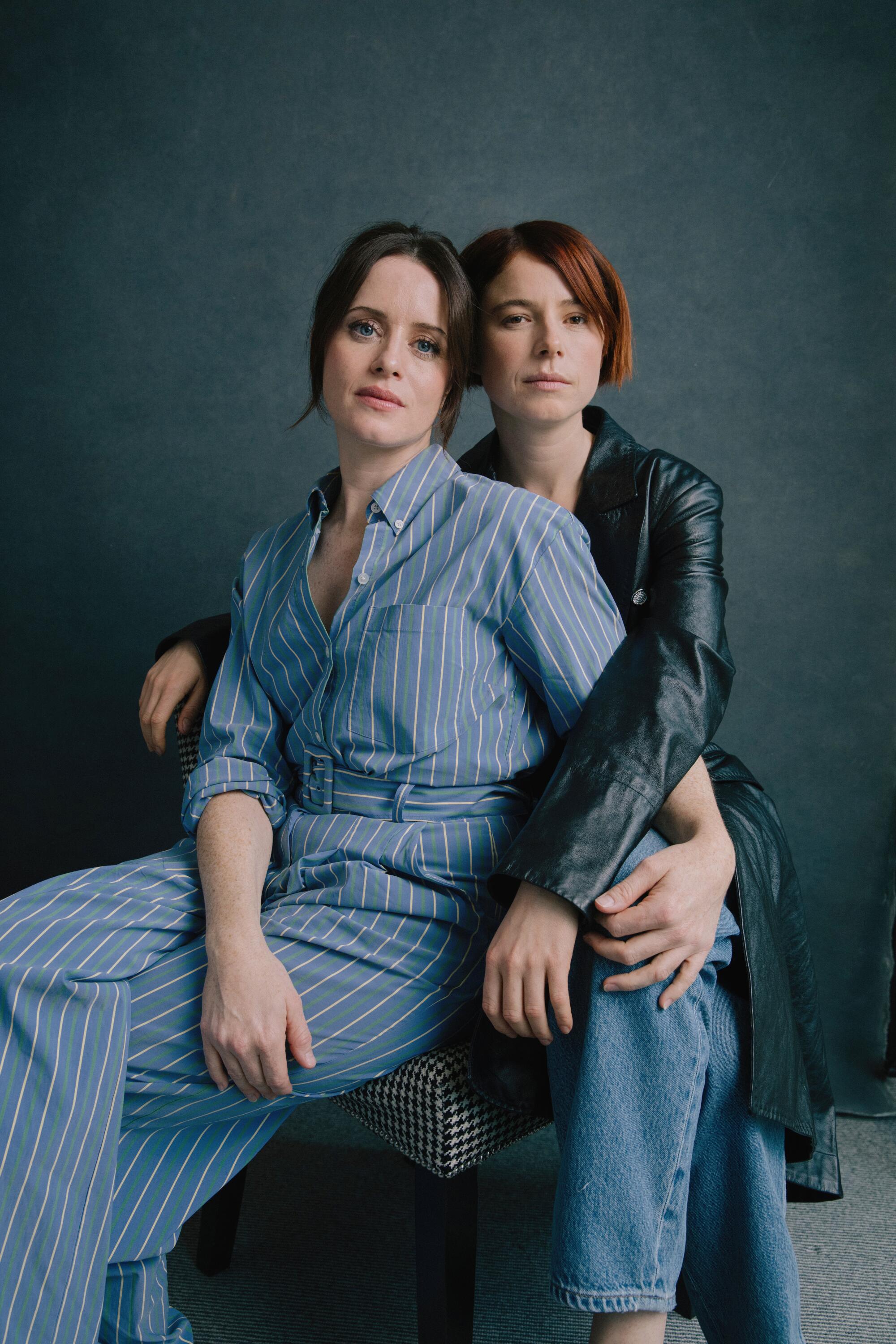
Claire Foy is talking about TikTok or, more precisely, how she doesn’t understand TikTok and needed the younger cast members on the set of her new film “Women Talking” to help her navigate the popular app, when co-star Jessie Buckley stands up and starts doing what she calls that “flossy thing,” swinging her arms in her oversize sweater, doing the celebratory dance in the best possible way and laughing uncontrollably.
“Now,” Foy tells me, “picture Rooney Mara doing that wearing a Mennonite costume and a pregnancy bump, and you’ll have an idea of what we were like when we weren’t on that hayloft set.”
“Women Talking” premiered the first week of September at the Telluride Film Festival and has finally arrived in theaters after screening at several other film festivals throughout the last few months. Adapted from Miriam Toews’ 2018 novel, the film, written and directed by Sarah Polley, focuses on a group of women in an isolated, fictional Mennonite sect who have been drugged and sexually assaulted. They gather in a hayloft to decide whether to stay and forgive the men — the only way, they’re told, that they can enter the kingdom of heaven — or stand and fight the men. Or pack up and leave the only home they’ve ever known.
Foy plays the defiant Salome, a mother advocating that the women stand their ground. Buckley’s Mariche is equally ferocious, her anger and confusion laced with a caustic wit.
Today Buckley and Foy are in a New York hotel room and we’re talking by Zoom, a couple of months after a casual Telluride sit-down with the movie’s stellar ensemble, which also includes Rooney Mara, Judith Ivey, Ben Whishaw, Sheila McCarthy and Frances McDormand, one of the film’s producers, in a small role.
As reunions go, it was pretty grand, even if it was just the three of us.
‘This was a very unusual theatrical commitment from all of us. It was like a Broadway run,’ Sheila McCarthy says of the three-month film shoot.
One thing I heard after seeing the movie at Telluride was men saying, “‘Women Talking’? Hmm ... I’m not so sure.” Have you heard that too?
Foy: I have. I mean, what the f—? Yeah, who wants to see a film about people talking? Well, I do.
Buckley: It makes you think about the ways people consider women palatable in the film world. What’s brilliant and beautiful and bold about this piece is that Sarah allowed every person to have complex emotional landscapes that aren’t palatable. There’s a lot of ugly truths within all of these women, which is challenging and hard to sometimes swallow. But it’s the most honest representation of who we are. And that’s far more interesting than just being a housewife or a hopeful bride. I don’t want to be part of that. It doesn’t fill me up.
Foy: I have had my eyes opened enormously about whether some people are ready for what this film is — and what it means for film. The fact that women talking is a concept that some people really struggle with ... [Foy starts to laugh and can’t finish the thought. Buckley joins in.] Sarah says this all the time: “12 Angry Men” could be called “Men Talking.” And I wouldn’t be put off by a film called “Men Talking,” seeing as most films I’ve ever seen in my life are about men talking.
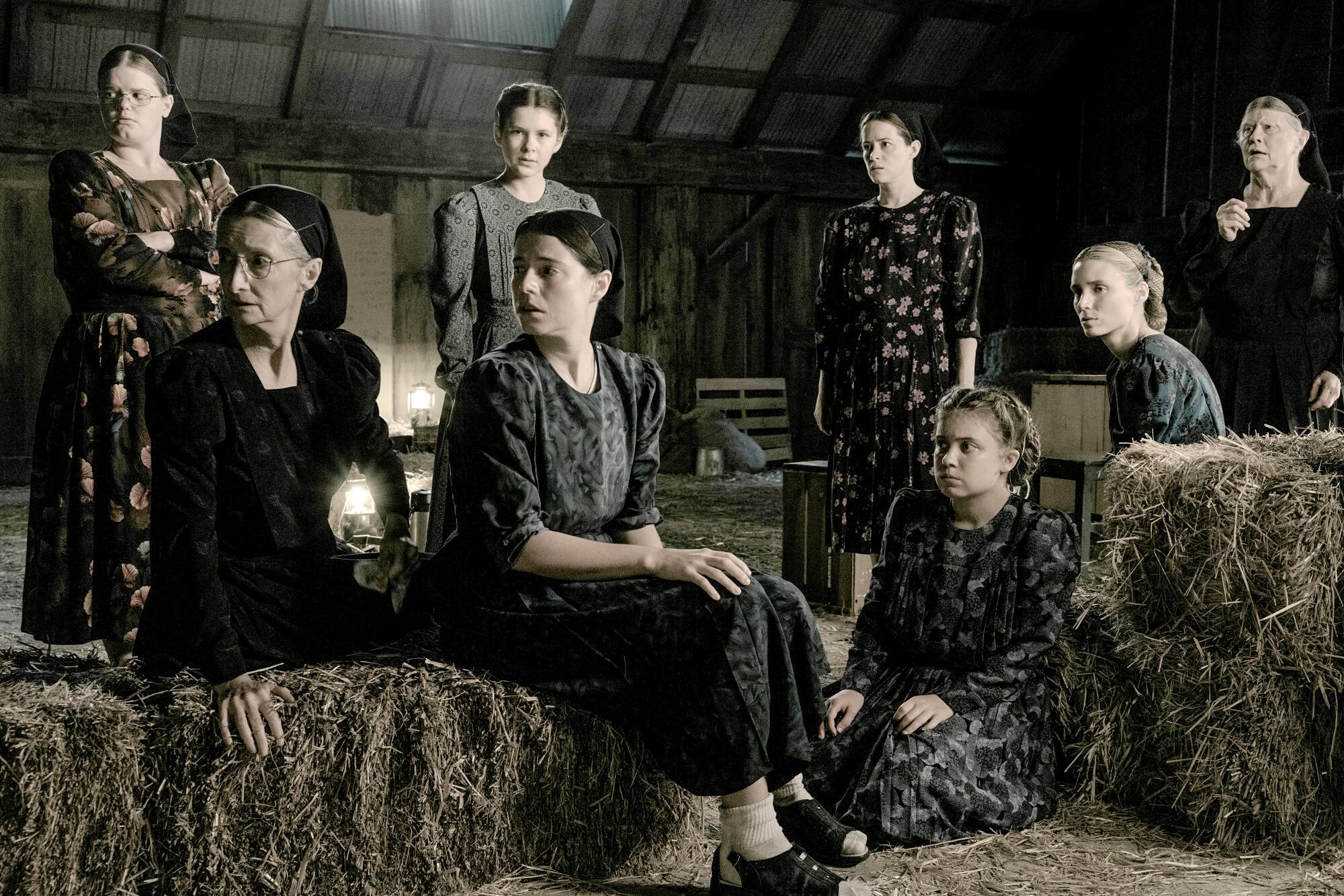
Most of the movies I grew up watching were men blowing up s—.
Foy: Those too!
So how did being in a movie that was so female-driven feel?
Buckley: It reminds me about the conversation I heard when I was 18 that made me think I needed to be small and that I needed to emotionally contort myself to find acceptance in the world. Being part of this film was like, “Bring it all. If you’re angry, bring it. If you’re hopeful, bring it. If you’re sad, if you’re scared, if you’re full of desire, bring it. What are your dreams? Bring that.” Not just something that fits because it looks nice and it tastes like Coca-Cola. That’s boring.
Foy: The people who want you to contort yourself and make yourself small aren’t the audience for what you want to give in life. What I love about the women in this movie is that they all have the floor and they all express themselves in different ways. And, agree, disagree, nobody takes it personally.
Buckley: At Toronto [International Film Festival], someone in the audience asked what we hoped people would take away from the movie. I remember being so moved at hearing Shayla Brown, one of the young women who plays Fran’s daughter, answer: “I’d want them to take away that it takes a huge amount of courage to stay. It takes a huge amount of courage to fight. And it takes a huge amount of courage to leave.” That’s a 16-year-old young woman saying that. If you get a 16-year-old woman knowing that ... [Buckley pauses.] Sorry. I’m going to cry. [Foy laughs, and Buckley does too.]
Fed up with ‘casual sexual comments’ and ‘misogynist dismissal,’ the writer-director used ‘Women Talking’ to build a better film set. Here’s how
Sarah had some nice things to say about you two. Do you mind if I read them and then maybe you can comment on what she says about the other?
[Buckley pulls her sweater up over her head.]
I’m not asking you to brag about yourselves!
Foy: Start with Jessie!
She said Jessie has a pure, raw power that is unrivaled in any actor in our time and that she was constantly surprising us and had the courage to constantly surprise herself.
Foy: Jessie makes everyone braver. [She looks at Buckley.] You must know this. Just keep hiding in your jumper. But when you see how brave she’s being, it makes you feel safe and gives you the courage to try something different. Our characters are opposing each other a lot of the time. But also they’re the most similar. They have a lot of beef, but there’s an unspoken sisterhood there. Those scenes where we would go at each other, I’d be like [screaming], “Yes! C’mon! C’mon!” I think that fearlessness costs her, but Jessie could never live a half-life. She has to take everything life gives her and devour it and feel it and live it.
Buckley: I’m a piggy.
Foy: You’re a little life piggy! And that company of actors would not have been complete without her energy.
Buckley: OK. Enough. Read me Claire’s.
She said, “Claire Foy is an acting machine ...”
Foy: Oh ... I sound like a robot. [Laughs.]
“She often had to do something difficult, literally 130 times as we went around the room three days, and she did it with the same intensity for everyone else’s close-ups. Her technical skills are inspiring, as is her constant generosity for her fellow actors.”
Foy: But we all did that for everyone. No one dropped the ball.
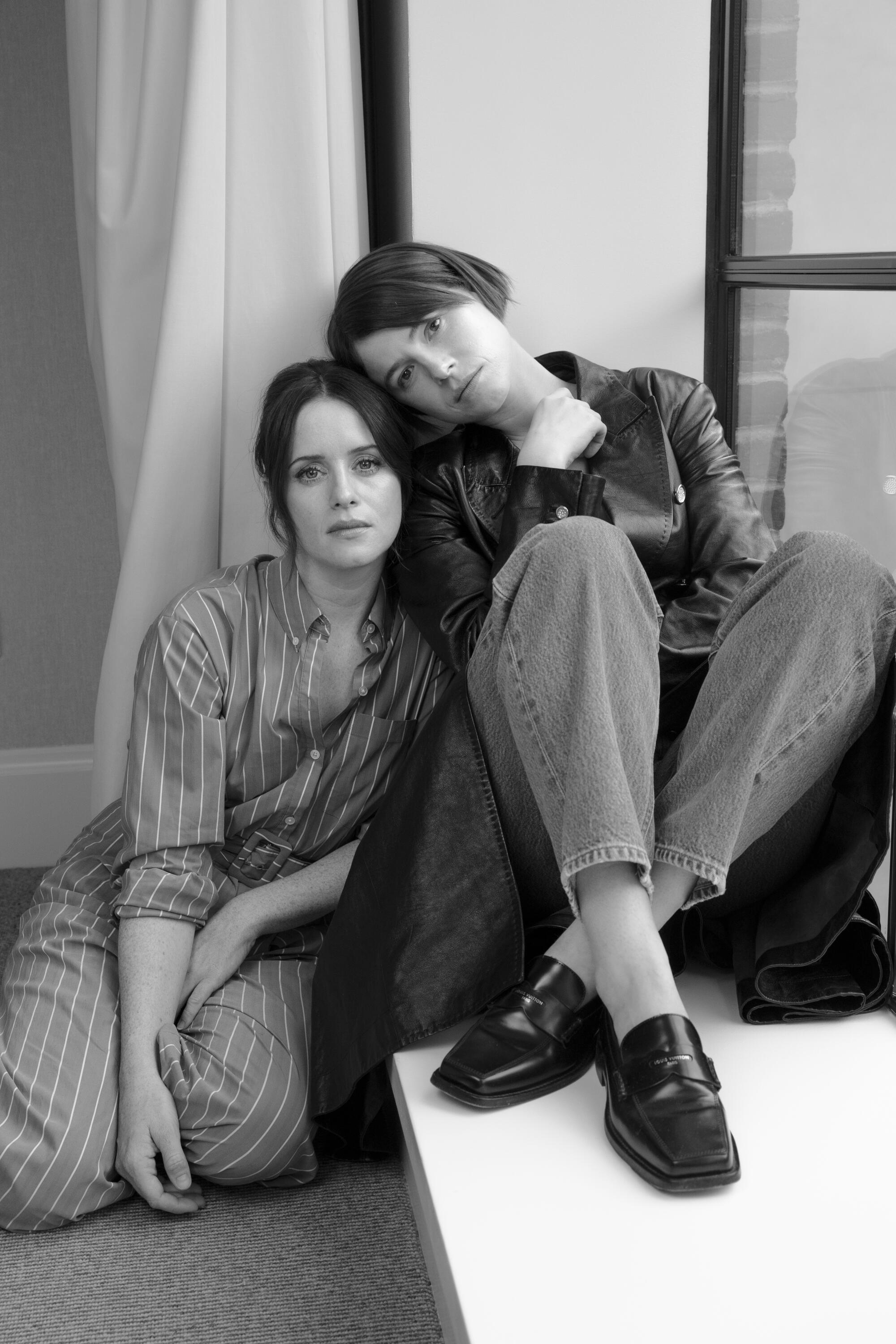
Buckley: No, they didn’t. But you ... Salome had such a force. You were burning down houses around you with that energy. And to keep that kind of energy and force and commitment time and time again ... you’re like that in everything you do. And I always feel riveted watching you and changed by you.
Foy: Aaaaaaaah ... stop it! I think we’d be more comfortable talking about what we dislike about the other. [Laughs.]
Buckley: We were just talking today about when we were in our little green room, which was so strange ... oh, God, I wish you could have seen it. If there was behind-the-scenes footage of what the green room was like, it’d be a film unto itself. There was this sad table with boiled eggs chopped in half and dates and celery, and me and Claire were in little beds beside each other, like hospital beds. And we’d shuffle back to the green room after Claire had poured her heart and fire and everything. And none of us would talk about what had just happened.
You know, we would all shuffle over to the attic in our little socks and sandals and know we were about to do something big, something was going to happen with Claire or Rooney or Ben or Sheila or whoever, and then you’d come down the stairs and you’d have to do something really normal because something enormous had just happened. And Claire does that every single time with every character she plays. She lands this enormous ripple into the ocean and goes, “Here you go. Now what are we having for breakfast?”
Foy: None of us talked about our experiences relating to what the film is about. The film is not just about domestic violence and sexual abuse. It’s also about family relationships ...
Buckley: Female friendships ...
Foy: And none of us spoke about what we were bringing to the table ...
Buckley: Ever.
Foy: I felt a deep respect watching someone be really open and vulnerable. You are watching someone struggle with something or expose themselves in a way that was precious to witness. And we all gave each other cuddles, and there were moments when we knew not to touch someone. And we never wanted to ... “pry” is not the right word. We were all bringing our own experiences, and we got to know each other from seeing that, rather than knowing what that was about. Imagine if we had all gone back to the room and cried, “That reminds me of the time ...”
Buckley: Oh, God. Instead we talked about what we were going to eat. [Laughs.]
More to Read
From the Oscars to the Emmys.
Get the Envelope newsletter for exclusive awards season coverage, behind-the-scenes stories from the Envelope podcast and columnist Glenn Whipp’s must-read analysis.
You may occasionally receive promotional content from the Los Angeles Times.
